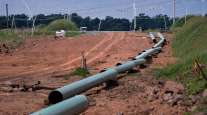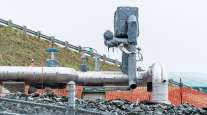Senior Reporter
US Senate Transportation Policymakers Press for Pipeline Security

[Stay on top of transportation news: Get TTNews in your inbox.]
The leaders of the U.S. Senate’s freight committee called on the Biden administration, congressional colleagues and private industry stakeholders to enhance security operations following the cyberattack on Colonial Pipeline.
Senate Commerce Committee Chairwoman Maria Cantwell (D-Wash.) warned that threats of cyberattacks capable of shutting down infrastructure operations are ongoing. And, as was the case with the Colonial Pipeline attack in May, a disruption of petroleum materials across several states hinders the economy.
“The rapid growth in the number and sophistication of cyberattacks is the alarm bell ringing about the need to immediately bolster the cybersecurity of our critical infrastructure,” the chairwoman noted during a hearing July 27.
She continued, “The federal government should be part of the solution. We need to bring about critical infrastructure investments in technology that can help the electricity grid and companies secure their networks from these kinds of intrusions.”

Could this be the trucking industry’s roaring '20s? Business is booming, thanks, in part, to a slew of innovative technologies. With host Mike Freeze, we begin to wonder what’s next? Hear a snippet above, and get the full program by going to RoadSigns.TTNews.com.
Sen. Roger Wicker (R-Miss.), the panel’s ranking member, emphasized potential benefits of interagency operability, as well as public-private agreements designed to safeguard pipeline operations and infrastructure networks from cyberattacks. Wicker and Cantwell touted legislation considered by the panel meant to boost pipeline protections.
“As the federal government considers ways to improve the cybersecurity framework of the pipeline sector, it will be increasingly important for the public and private sectors to coordinate their efforts more closely,” said Wicker. He added, “Coordination between government and industry is needed to improve information sharing about emerging cyber threats and best practices to address them. Industry should also build strong relationships with their regulators and law enforcement to increase that collaboration.”
Polly Trottenberg, deputy secretary at the U.S. Department of Transportation, told senators that the Pipeline and Hazardous Materials Safety Administration, or PHMSA, is proceeding with inspections and enforcement throughout operations nationwide. Specifically, the agency is monitoring pipeline control rooms, integrity management plan requirements and emergency response plans.

Trottenberg
She emphasized that to prevent further cyberattacks similar to the one involving Colonial Pipeline, the department is collaborating with other agencies.
“The Colonial Pipeline cybersecurity incident spotlighted the importance of trusted and timely information sharing, as well as public and private sector partnership in transportation cybersecurity,” she told the Commerce Committee. “It also underscored that we need to keep learning and adapting quickly to meet increasingly complex and sophisticated cybersecurity challenges. DOT will continue to work across the federal government and with the private sector to advance the cybersecurity of the pipelines that fuel and sustain our nation.”
David Pekoske, administrator at the Transportation Security Administration, told senators the agency is determined to continue evaluating and supporting implementation of cybersecurity across the transportation sector, as well as collaborating with other agencies.
“The pipeline system is crucial to U.S. national security, transportation, and our energy supply. These pipelines provide connections to other critical infrastructure upon which we depend, such as power plants and the aviation gasoline fuel supply for airplanes,” said Pekoske.
An executive order from President Joe Biden soon after the Colonial Pipeline attack seeks to bolster federal capabilities. The order establishes a cybersecurity safety review board. Colonial Pipeline’s operations consist of 5,500 miles of pipe to transport about 100 million gallons of fuel daily. The company confirmed it had paid about $4.4 million to restart its systems after the hack in May disrupted the petroleum market on the East Coast.
READ MORE: US Moves to Better Protect Infrastructure From Cyberthreats
Other recent cyber incidents include the SolarWinds Russian intelligence cyberattack that targeted federal agencies, and the “Hafnium” attack on Microsoft Exchange users. Cyberattacks also have targeted state and municipal agencies.
Want more news? Listen to today's daily briefing below or go here for more info:




